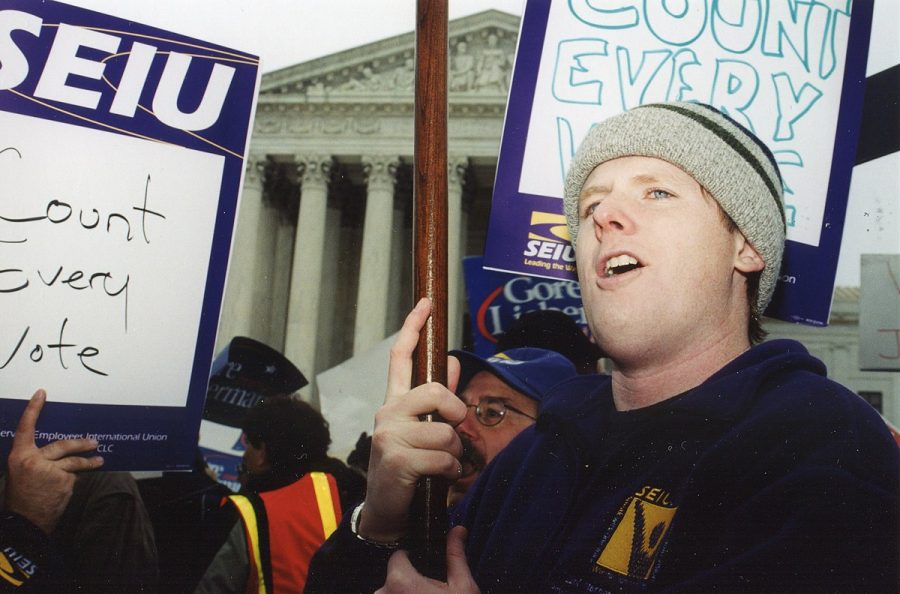Opinion | Masses must decide election, not courts
Photo Courtesy of Elvert Barnes
Demonstrators chant outside the Supreme Court Building during the Presidential Election 2000 Disenfranchised Voters Protest on Dec. 11, 2000.
Oct 30, 2020
In an election of such extraordinary circumstances, it’s fair to say it is an election unlike any other with consequential ramifications that will thrust the country into a new unknown. Society has had to adapt to a multitude of different situations, and the political arena is no different.
The inherent democratic integrity of elections in America rests upon the fundamental principle that the people decide. While the aftermath may be tumultuous, there should be no question of the legitimacy in the people’s votes and it is outside the purview of the Supreme Court to involve themselves in deciding the outcome.
This year has shaped up to be one of the more memorable and divisive times in recent memory, so it’s only fitting that this election evokes the temper of the beginning of the century, which started with the head-scratching decision of Bush v. Gore.
In the 2000 presidential election between George W. Bush and Al Gore, the Supreme Court ruled Bush would be the next president of the United States because the Court held that Florida’s recount used procedures that violated “the equal dignity owed to each voter.” The Court ruled since standards used to recount ballots varied between counties, the process was a violation of the Equal Protections Clause and effectively declared Bush the victor.
However, this legal analysis by the Court was unique only to the 2000 election and lower courts were even instructed to never rely on this obscure principle for ballot tabulation again.
Get The Daily Illini in your inbox!
Twenty years after the unprecedented rationale, an election may once again be decided by the Supreme Court. Only this time, the debate is over perceived fraudulent mail-in ballots skewing election results.
One of the major political implications as a direct result of the global pandemic is the increase in mail-in ballots as voters are foregoing marching to the polls — in the literal sense. As history has shown, there are more ways to influence an election beyond casting a ballot.
President Donald Trump has adamantly asserted his distrust of the validity of mail-in ballots, claiming they could be manipulated and are rife with fraud. Trump’s criticisms of a long-held voting practice utilized by citizens for years, including military personnel, are unfounded and merely a ploy to further his political agenda.
There is no evidential basis to question the legitimacy of voting by mail, despite the efforts of Trump and the Supreme Court to minimize decades of election law.
In the past week, numerous legal decisions directly impacting the results of this election have been passed, including the Supreme Court’s refusal to extend the deadline for Wisconsin voters, to cast ballots by mail, a decision that irresponsibly cited Bush v. Gore, and the Texas Supreme Court ruling the state can limit drop-off sites for election ballots to one per county.
These cases exemplify the sheer influence state and federal courts have in deciding the outcome of elections, essentially overpowering the people’s voice and overstepping dual sovereignty.
American election law should not be used as a mechanism to gain partisan advantage, but it cannot be denied the Court’s rulings could very easily swing an election in favor of the Court’s ideological majority.
Twice now, the Supreme Court has intervened in the election process — shutting down the Florida recount and refusing an extension to ensure voters could still cast ballots during a pandemic.
In the first case, there is still bitterness surrounding the circumstances around how Bush was elected president and the Court’s decision. In the latter, the aftermath will play out in the weeks to come, but wherever the chips may fall, it has to be at the hands of individual voters, not the Supreme Court.
Alice is a junior in LAS.






